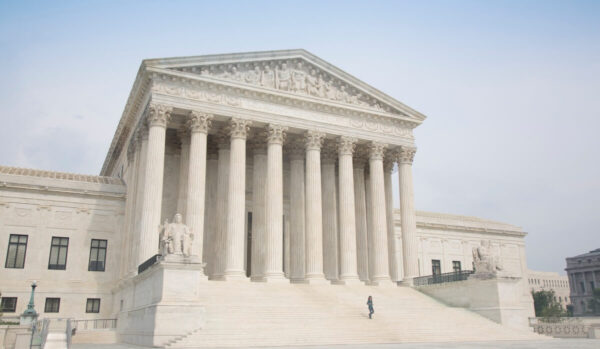The U.S. Supreme Court turned away a case brought on behalf of white and Asian American parents who were challenging a pandemic-era admissions policy of Boston Public Schools (BPS) aimed at increasing the socioeconomic diversity at its three prestigious “exam schools.”
Justice Samuel Alito, along with Justice Clarence Thomas, strongly dissented with the majority decision to reject the case. Alito called the BPS admissions policy a “glaring constitutional error that threatens to perpetuate race-based affirmative action” in his written statement.

The lawsuit, filed by the Boston Parent Coalition For Academic Excellence, took issue with a decision by BPS in 2020 to change its admission criteria to make the student bodies at Boston Latin School, Boston Latin Academy, and the O’Bryant School of Math and Science, which have historically leaned white and wealthy, more representative of Boston’s student population as a whole.
Instead of admitting students with the highest standardized test scores and grade point averages, as it had for decades, the school board opted to nix the exam (which was not possible to administer during the COVID-19 pandemic) and to adopt a “race neutral strategy” that relied on applicants’ grades and ZIP codes, giving more weight to lower median income households.
When the plan was implemented in 2021 it produced the demographic outcomes sought by the school board. In the 2021-2022 school year, 43 percent of admitted students at the exam schools were economically disadvantaged, compared to 35 percent in the prior year, according to court documents filed by the school board.
Black students increased from 14 percent to 23 percent; Hispanic students increased from 21 percent to 23 percent; white students decreased from 40 percent to 31 percent; and Asian students decreased from 21 percent to 18 percent.
The overall school-age population in Boston in 2021 had a racial composition of 35 percent Black, 36 percent Hispanic, 16 percent white, 7 percent Asian, and 5 percent multiracial; and 63 percent were considered economically disadvantaged.
The parent coalition representing 14 White and Asian American parents decried what they called the “zip code quota policy,” arguing in their 2021 lawsuit that the new policy was “using Boston zip codes as a proxy for race,” violating the Equal Protection Clause of the Constitution, which bars discrimination based on race or ethnicity. Their arguments anticipated the more recent affirmative action case law, including Students For Fair Admissions v. Harvard, that has struck down the use of race-conscious policies in college admissions.
A federal district court in Boston and later the First Circuit Court of Appeals disagreed, the latter ruling in December 2023 that the admissions plan caused no relative no disparate impact on white and Asian students, who respectively received 31 percent and 18 percent of the exam school invitations, thus continuing to win seats at a rate much greater than their share of the applicant pool.
The policy change sparked heated debate among Boston parents angling for their children to attend the prestigious exam schools, whose graduates tend to gain admission and win scholarships to top-rated colleges, including Harvard and other Ivy League schools, at rates much higher than other public high school graduates.
Among several lively threads on Reddit about the new admissions policy, one person complained that “if a student is in one of the five ‘poor address’ tiers, they are essentially GUARANTEED admission. If a student is in the top two wealthiest tiers, their odds are only 50%. … This system is a giant FU to them.”
Another person who identified themself as a high school teacher noted that the old system relying heavily on exam scores “was always ‘gameable,’” with wealthy Boston families sending their kids to private elementary schools and “paying lots of $$$ for tutoring and test prep” prior to sending them to the free public exam schools in seventh grade. “The students from the poor families don’t get to the play that game,” the Reddit user noted, but the new system “has done a much better job at trying to inject a degree of fairness into the exam school entry process.”
In its appeal petition, the parent coalition again made the case for the unfairness of the new policy and its disparate impact on white and Asian American student applicants, who had received a significant drop in admission letters compared to prior years.
In its opposition brief, Boston Public Schools argued, “No precedent of this Court remotely suggests, as petitioner’s argument does, that a historically advantaged racial group has a right to insist that public bodies choose any new criteria with an eye toward preserving that group’s historic privilege.”
Conservatives hoping the Boston schools case would provide a definitive legal precedent on the use of race in K-12 school admissions were disappointed when the Supreme Court declined to hear the case on Monday.
It’s the second time this year that the majority of the court decided not to hear a challenge to a high school admissions policy that relies on geography in lieu of race, after passing on a case involving a Virginia magnet school in February, noted the Commonwealth Beacon.
“The difficulty, as I see it, is that Boston has replaced the challenged admissions policy,” Justice Neil Gorsuch wrote in a statement.
Gorsuch, who harbors concerns about the lower courts’ decisions, noted that the parents’ lawsuit does not challenge the school system’s current admissions policy, which now relies on exam scores, grades, home ZIP codes and socioeconomic status. Those developments “greatly diminish the need for our review,” he concluded.
In his dissent, Alito noted that the Boston school board committee “put race front and center” in its deliberations on the admissions policy, and said he found the plaintiffs’ appeal petition provided “overwhelming direct evidence of intentional discrimination.”
Noting that the schools committee members explicitly “worked to decrease the number of white and Asian students at the exam schools in service of ‘racial equity,’” he called the policy “racial balancing by another name” that is “undoubtedly unconstitutional. … I would reject root and branch this dangerously distorted view of disparate impact.”
Chris Kieser, senior attorney at the Pacific Legal Foundation, which represented the parent coalition, called the court’s decision “disappointing” in a statement.
“Every student should have an equal opportunity to succeed based on their merit, not where they live or the color of their skin,” said Kieser, adding that “the government’s use of skin color or ethnicity to choose who can attend public schools is a critical constitutional question that must be settled.”
Oren Sellstrom, litigation director of Lawyers for Civil Rights, which represented two families who intervened in the lawsuit in support of the admissions policy, said the court’s decision shows school districts should take steps to ensure that educational opportunities are available to all students equally, reported the Boston Globe.
“Our schools are stronger when classrooms are diverse and students from a wide range of backgrounds can learn from each other,” he said in a statement.
Iván Espinoza-Madrigal, executive director of the civil rights nonprofit, was encouraged by the high court’s decision to ignore the parent coalition’s appeal.
“Ever since the U.S. Supreme Court’s decision in the Harvard affirmative action case, right-wing groups have unsuccessfully tried to extend its reach to challenge diversity, equity, and inclusion,” he said. “But today’s action by the Supreme Court sends a clear signal: there’s no appetite for extending the affirmative action decision beyond its narrow scope in college admissions.”


